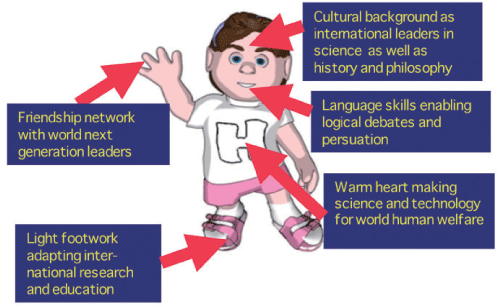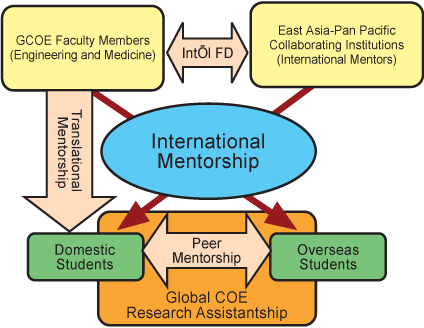HOME > Educational Reform
Educational Reform
Goal
In the Tohoku University Global COE program, the ÓGlobal Nano-Biomedical Engineering Network CentreÓ, we seek to integrate nano-biomedical engineering activities within East Asian and Pacific Rim countries. It is not restricted to those areas, but our intention is to start to organise the most active institutions in this region in the hope that worldwide collaborations will be implemented. The countries within the Pan-Pacific Rim support almost one-third of the world's population, and this population maintains the fastest growing economies today. To consolidate the infrastructure and growth of our and partner countries, we need to encourage our young scientists and engineers to collaborate in a global environment. It will greatly assist the continuous and increasing well-being of the nation's health and economy, which is a major goal of our global COE program.
Success in a global situation requires cross-cultural, international experience in the workplace. Such a globally enlightened workforce is necessary for science and engineering research, but is equally important in industrial development. Enterprises increasingly require employees who are not merely technically skilled, but who are able to work as a principal partner and contributor to interdisciplinary teams across international cultures and boundaries. This COE program will be a leading project in such truly global education and research.
Education through synergistic research activities in engineering and medicine is the most important factor in establishing the global COE program. It is sometimes felt that Japanese students are too reserved and not able to express their knowledge and achievements within the scientific domain. It is thought to be due to their lack of or inappropriate exposure to international environments. We have therefore carefully designed the educational system of the global COE program to involve young investigators and students in an international environment by immersing them in international activities.

Novel Educational Activities
In the preceding 21st Century COE program we proposed and successfully completed two types of novel
i) Nomadic education
Students at Tohoku University, under the umbrella of the 21st Century COE program, were encouraged and supported to study abroad for short- or longer-term periods during their formal course and research work period in graduate school. A large number of students have experienced study at well-known universities around the world.
ii) Itinerant studentship
Within the university, doctoral students were also encouraged to visit and stay temporarily at different laboratories, of their own choice, to learn new technologies and absorb knowledge and experiences in different disciplines. This is particularly useful for engineering students to study medical and biological techniques and conversely for medical students to understand and to develop new medical devices for their own clinical applications.
In the newly started Global COE program, we have added three novel ideas:

i) Peer mentorship
Within the global COE program, we will invite excelling students from East Asian and Pan-Pacific countries to Japan as well as sending our students to universities and institutions in those countries to train them, so that they grow as internationally leading scientists. Students under the umbrella of the Global COE so that friendship and comradeship will be nourished for the development of future international collaborations, thoroughly founded on a regional basis.
ii) International mentorship
Professors and staff of not only Tohoku University but also of other universities and institutions in the above-mentioned areas will be organised in such a way as to always be ready to meet and mentor students from any of the other participating institutions.
iii) International faculty development
To accomplish the above plan, we teachers will need to be trained or retrained to become good mentors to other students. Thus, a requirement of the program for international faculty development will be implemented by sending our staff to overseas institutions and inviting corresponding researchers to Japan. The organisation of this faculty development is a crucial part of the program and will be conducted on a competitive basis.
Support for students
As such, truly integrated and engineering-led nano-biomedical study is a major feature of Tohoku University's nano-biomedical activities. Although the research is strong, it is important to note that a large majority of the budget is dedicated to the support of students. No research facilities are expected to be purchased within the COE program, as was the case in the former 21st Century COE program.Students supported by this new global COE program will be exempt from tuition fees and given support for living expenses and travel allowances for their research. Moreover, research grants will be given to excelling students, on a competitive basis, to promote independent study for examining their new ideas. Overseas students will be welcomed and accepted on the basis of international collaborations between Tohoku University and other institutions and will be supported similarly. This program is thus committed to provide education on the basis of internationally acknowledged advanced research, which is supported by many other grants.
In terms of research, the true integration of study and education in the different areas of engineering and medical disciplines are unique and distinctive from other similar programs and applications, not only Japan, but worldwide. It is well-known that a medicine-oriented program can become application-oriented and may easily lose its fundamental scientific basis. A further unique factor is the planned focus in the East Asian and Pacific Rim area. We want the prgramme grow on a firm basis of common economic and cultural interests in the region, using the word ÓglobalÓ not merely as an empty slogan but to mean substantial collaboration.